2025 Trillium Book Award Finalists
Share This Page
https://www.ontariocreates.ca/our-sectors/book/trillium-book-award/finalists-2025-trillium-book-award

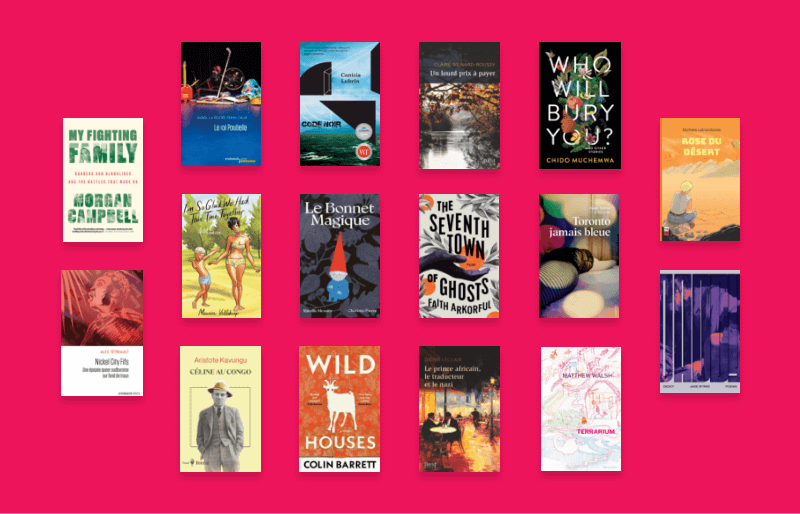
French-language Finalists for the Trillium Book Award
Honouring excellence in French-language literature by Ontario authors
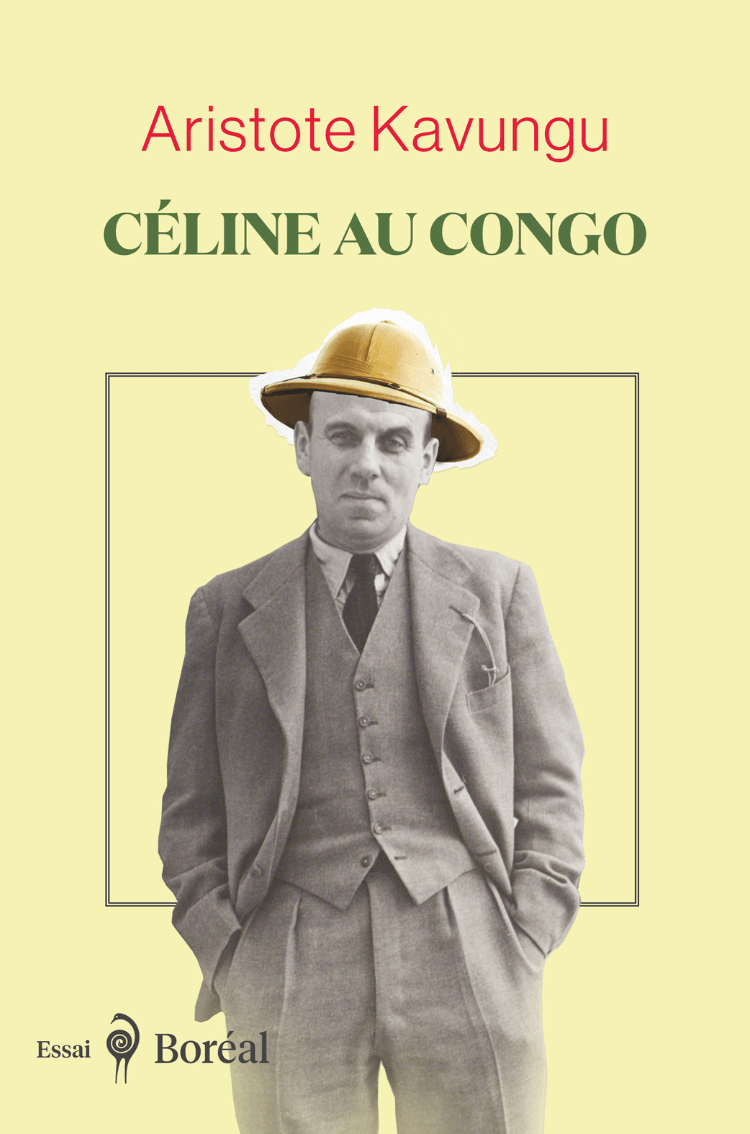

Céline au Congo
Aristote Kavungu, Les Éditions du Boréal
The character is astonishing. The writer is fascinating. Everyone is talking about him. He is being read more than ever before. Louis-Ferdinand Céline never gets unanimous approval; whether people are for or against him, there is always an objection or a denial.
His anti-Semitism is well documented. His racism is less so. Aristote Kavungu reread the pamphlets, which are blatantly racist, and also Voyage, in which he is equally so, except nobody had seen it. Is Céline’s racism even more soluble in his genius than his anti-Semitism? “I don’t like Negroes outside their own homes... that’s all,” isn’t that just a romanticized version of “France for the French”?
In this pamphlet – an eminently Célinian genre –, Aristote Kavungu’s primary objective is to reintroduce Céline’s anti-Black sentiment into the discussion of his anti-Semitism. He then proceeds to criticize France for its nearly collective decision to redeem itself at the expense of the Meudon recluse.
Aristote Kavungu was born in the Democratic Republic of the Congo to Angolan parents. He has degrees in French Language and Literature from Sorbonne Paris Nord University and education from the University of Ottawa. He was a Prix Anne-Hébert finalist for L’Adieu à San Salvador in 2001 and a Prix des lecteurs de Radio-Canada finalist and Toronto French Book Fair grand prize winner for Un train pour l’Est by Éditions L’Interligne in 2003. He also authored the novel Mon père, Boudarel et moi, a finalist for the Trillium Book Award. He teaches French Language and Literature in Whitby.
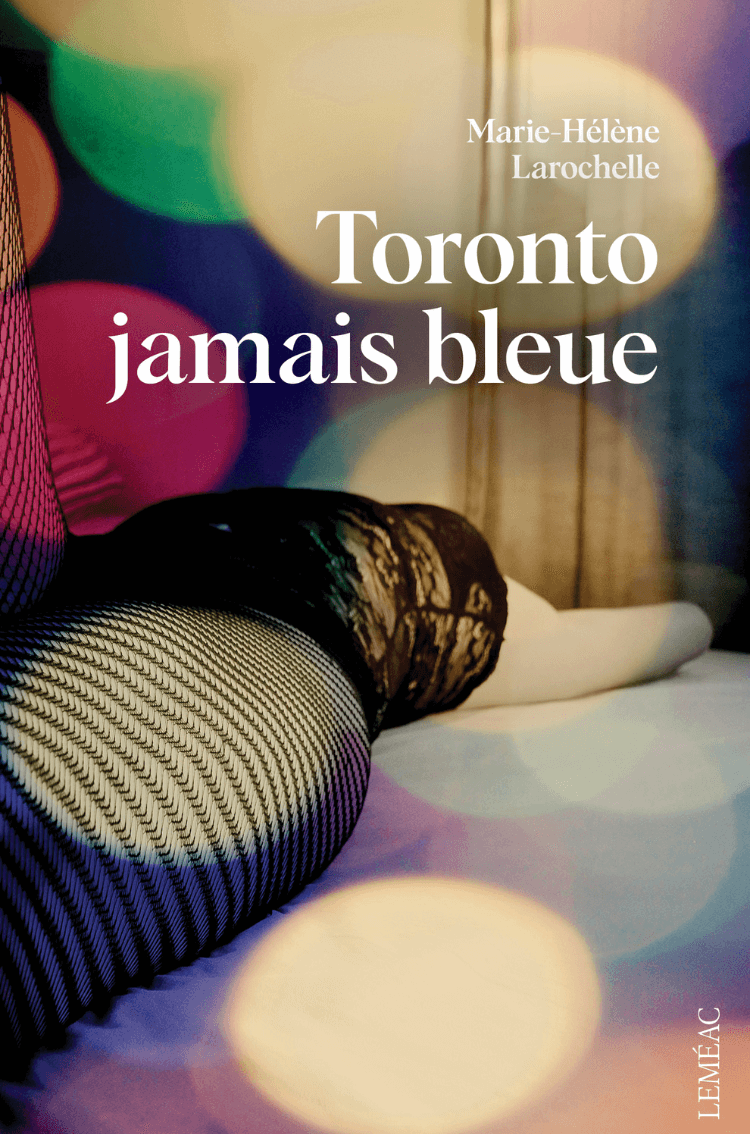

Toronto jamais bleue
Marie-Hélène Larochelle, Leméac Éditeur
Following the daily life of Hannah, a young homeless woman in Toronto who dreams of the seaside as she drifts from street to street, then the swaying of Carol, who is about to give birth in a filthy alley, and finally the comings and goings of four prostitutes in their twilight years who share a home, misfortunes, old clients and the small joys of outsider art, the novel traverses the days and nights of free and uncompromising women. However, as we see their lives intersect with relentless male despair, which only adds to their own disarray, we wonder if the monstrosity that inhabits them all is not the city itself, never blue and always gray, incapable of healing its own civic marginality.
Born in the city of Québec, Marie-Hélène Larochelle is a professor of literature at Toronto’s York University. She has published various scholarly works on monstrosity and invective, as well as the novels Daniil et Vanya (Québec Amérique, 2017), Je suis le courant la vase (Leméac, 2021), a finalist for the 2022 Trillium Book Award, and Toronto jamais bleue (Leméac, 2024), which won the 2024 Prix littéraire Janette-Bertrand.
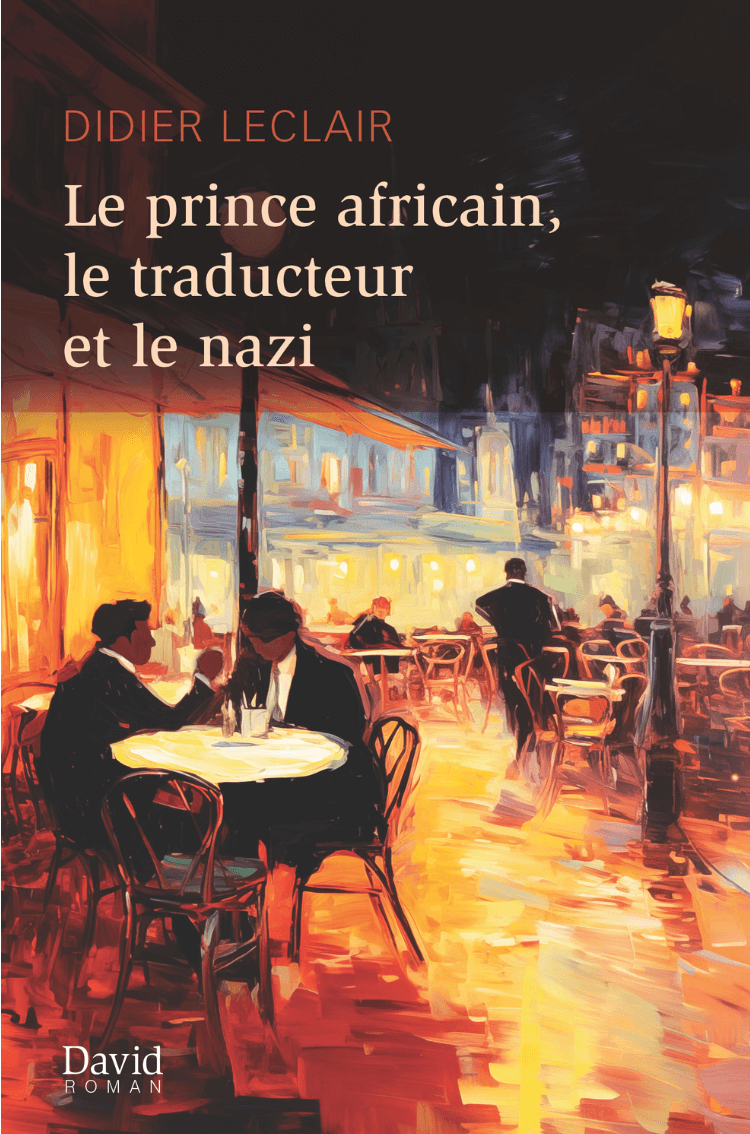
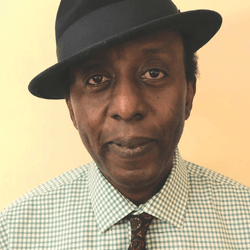
Le prince africain, le traducteur et le nazi
Didier Leclair, Éditions David
Antonio Jose Henrique Dos Santos Mbwafu, Crown Prince of the Kingdom of Kongo (in the Portuguese colony of Angola), gets involved in a diamond-smuggling operation between his country and France. In Paris, he is assisted by his Swahili translator and interpreter, Jean de Dieu, and his driver, Hans. He decides to travel to Lisbon to retrieve some bags of coffee that his father, King Pedro VII, sent him to sell. In the bags, there are diamonds…
Prince Antonio’s activities have caught the attention of Major Baumeister, a Gestapo torturer out to get his hands on the gems. A thrilling manhunt unfolds in Paris, pitting the Nazis against the Prince’s friends: Sarah, his Polish-Jewish girlfriend; Jean de Dieu, the dandy; menthol-smoking Jenny from China; Armando, the Brazilian café owner; and a host of other colourful characters.
In this enthralling spy novel, Didier Leclair depicts the occupation of Paris during World War II from an original perspective: that of Black people and colonized peoples who also refused to accept Nazism.
Didier Leclair, the pen name of author Didier Kabagema, was born in Montréal. He lived in several countries in Africa before settling in Toronto. He received the 2000 Trillium Book Award for Toronto, je t’aime, was a finalist for the 2004 Governor General’s Literary Awards for Ce pays qui est le mien and won the 2016 Prix Christine-Dimitriu-Van-Saanen for his novel Pour l’amour de Dimitri. He divides his time between literature and his passion for jazz.
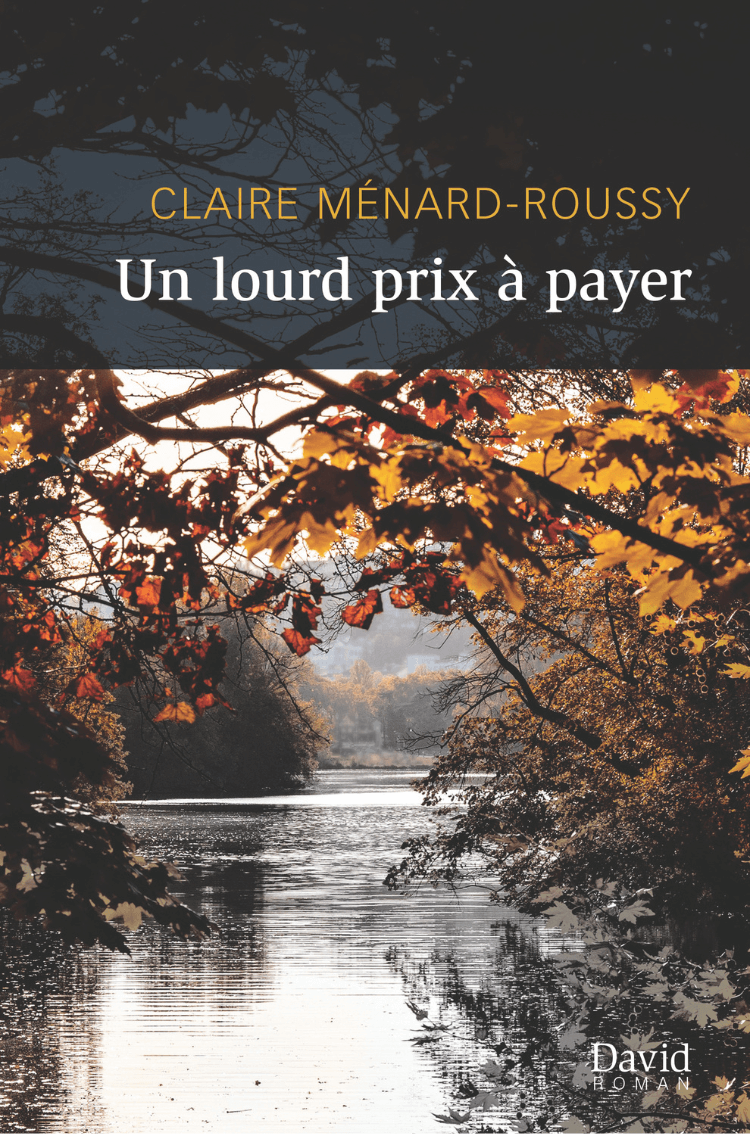
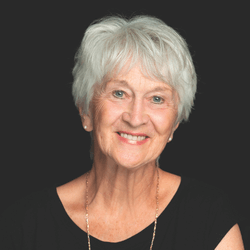
Un lourd prix à payer
Claire Ménard-Roussy, Éditions David
After World War II, Frans and Hannah Dykstra arrive in Canada, like many other Dutch families, hoping to find a brighter future. They settle on a farm in Eastern Ontario with their school-aged children, Margriet and Pieter, and their baby Adriaan. They begin to settle into their new life and realize their dream in this land of milk and honey.
But all is not well... An unexpected tragedy strikes, suddenly bringing an end to their stability and happiness. The whole village will be shaken and lives will be changed by the events that unfold. A police investigation is launched. What happened in September 1959?
In this captivating novel, which gradually turns into a real thriller, Claire Ménard-Roussy evokes with great realism and finesse the daily life of the small village of her childhood, while reminding us that the Canada of the 1950s was a welcoming land and that the challenges of immigration—isolation, homesickness, prejudice—are nothing new.
Claire Ménard-Roussy grew up in Glengarry County, Ontario, before pursuing a career as a teacher in Sturgeon Falls and Ottawa. Her debut novel, Raoul, tu me caches quelque chose, was published by Éditions Prise de Parole in 2019.
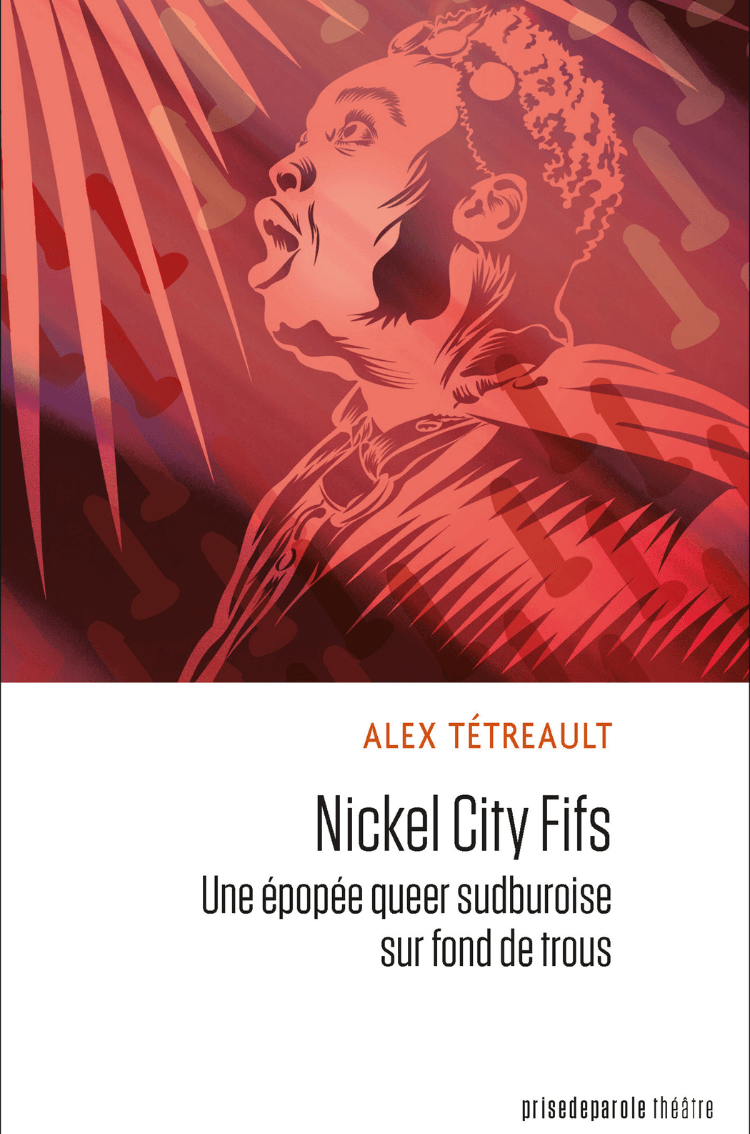

Nickel City Fifs
Alex Tétreault, Prise de parole
On an ordinary evening at Zigs, Sudbury’s gay bar, a young queer person in need of community embarks on an extraordinary journey of discovery. Under the auspices of Holy Poetry, the crater’s guardian spirit, the bar’s colourful wildlife introduces him to their magical world, inviting him into eclectic and absurd worlds. Will they be able to convince him to join them, or will they lose him to the big city?
The first play by Alex Tétreault, an emerging figure on the Sudbury theatre scene, Nickel City Fifs distorts and subverts Franco-Ontarian culture in order to queerify it, to reimagine its history. In an atmosphere that is campy, irreverent, vulgar and assertive, where call and response songs meet drag art, where the smell of sugar pie mingles with that of leather, and where Dalpé rubs shoulders with Etheridge, his Sudbury epic is a love letter to the region’s queer and Francophone communities.
Born and based in N’Swakamok (Greater Sudbury) in Northern Ontario, Alex Tétreault is a queer Francophone artist and community activist. He is a graduate of Laurentian University’s now defunct French-language Theatre and Political Science programs. In the spring of 2024, he became Greater Sudbury’s eighth Poet Laureate.
English-language Finalists for the Trillium Book Award
Honouring excellence in English-language literature by Ontario authors
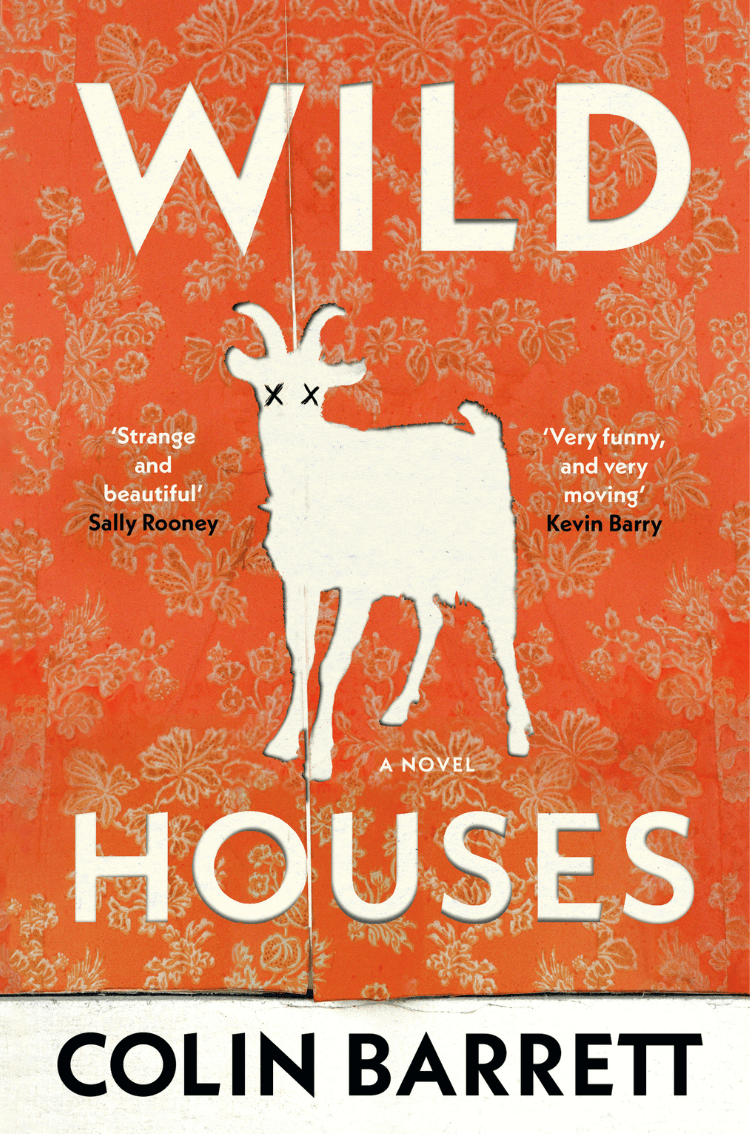
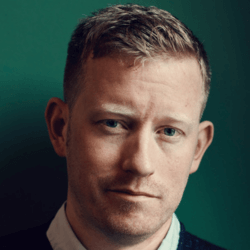
Wild Houses
Colin Barrett, McClelland & Stewart / Penguin Random House Canada
“A writer of glaringly obvious talent, operating at a seriously high level.”—The Guardian
From the award-winning writer of Homesickness and Young Skins, a darkly funny and deeply moving debut novel about crimes of desperation, dreams abandoned, and small-town secrets that won’t stay buried.
As Ballina in the west of Ireland prepares for its biggest weekend of the year, the simmering feud between small-time dealer Cillian English and County Mayo's fraternal enforcers, Gabe and Sketch Ferdia, spills over into violence and an ugly ultimatum.
When the reclusive Dev answers his door on Friday night, he finds Doll—Cillian's bruised, sullen, teenage brother—in the clutches of Gabe and Sketch. Jostled by his nefarious cousins, goaded by his dead mother's dog, and struck by spinning lights, Dev is unwillingly drawn headlong into the Ferdias' revenge fantasy.
Meanwhile, seventeen-year-old Nicky can't shake the feeling something bad has happened to her boyfriend Doll. Hungover, reeling from a fractious Friday night, and plagued by ghosts of her own, Nicky sets out on a feverish mission to save Doll, even as she questions her future in Ballina.
Colin Barrett was born in Canada in 1982 and grew up in County Mayo. In 2009, he was awarded the Penguin Ireland Prize. Homesickness was named a Best Book of the Year by the New York Times, and Young Skins won the Frank O’Connor International Short Story Award, the Guardian First Book Award, and the Rooney Prize for Irish Literature. His work has been published in The New Yorker, A Public Space, Granta, and The Stinging Fly. In 2015, Barrett was named a National Book Foundation “5 Under 35.”
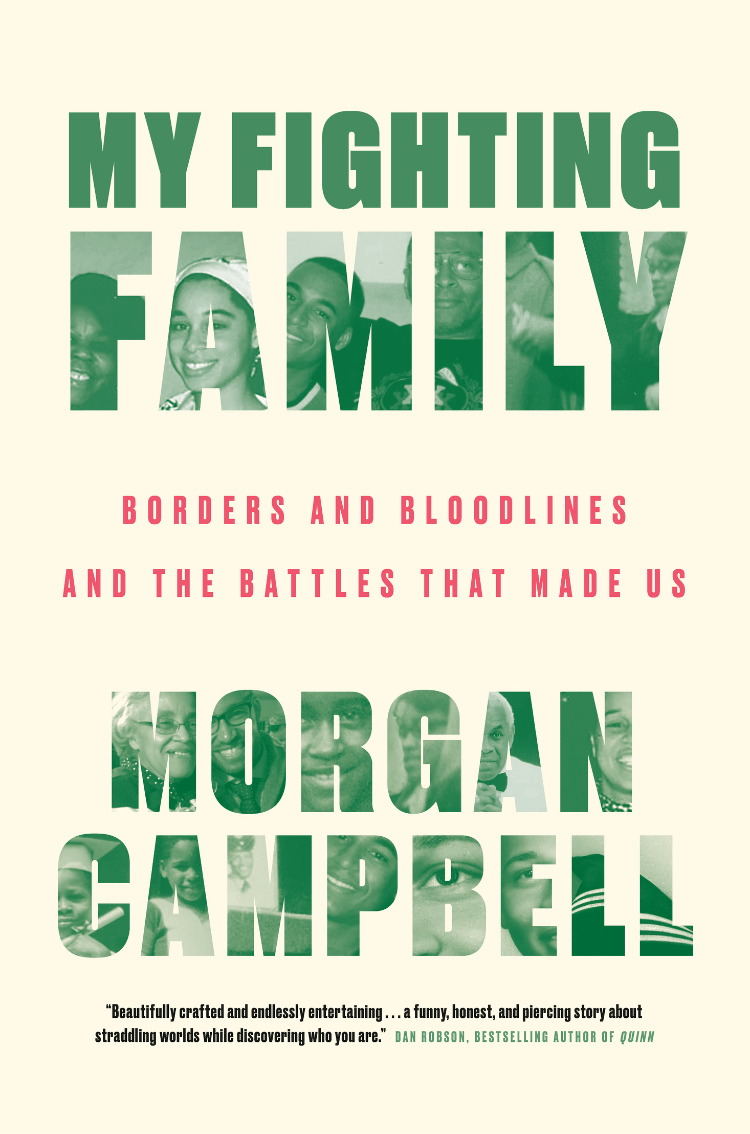

My Fighting Family
Morgan Campbell, McClelland & Stewart / Penguin Random House Canada
The debut memoir from award-winning journalist Morgan Campbell: an incredible history of a family’s battles across generations, a hilarious and emotional coming-of-age story, and a powerful reckoning with what it means to be Black in Canada—particularly when you have strong American roots.
Morgan Campbell comes from “a fighting family,” a connection and clash that reaches back to the south side of Chicago in the 1930s. His father’s and mother’s families were both part of the Great Migration from the U.S. rural south to the industrial north, but a history of perceived slights and social-class differences solidified a great feud that only intensified over the course of the century after the families came together in marriage and split up across the border.
Morgan’s maternal grandfather, Claude Jones—a legendary grudge-holder, as well was an accomplished musician, peer of Oscar Peterson, and fixture of the Chicago jazz scene—was recruited to play some shows in Toronto, fell in love with the city, and eventually settled in Canada in the mid-1960s, paving the way for Morgan’s parents to join him amid the tumult of the Vietnam War and the Civil Rights movement. Morgan’s paternal grandmother, Granny Mary, however, remained stateside, a distance her schemes and resentments would only grow to fill.
That fighting spirit wasn’t limited to the family’s own squabbles, though—it animated the way every generation moved through the world. From battling back as a group against white supremacist newcomers who violently resisted Black neighbours, to Morgan’s pre-teen mother burnishing her own legend by cold-cocking some racist loudmouth bullies, the lesson was clear: sometimes words weren’t enough.
In Canada, the Campbells started a family of their own, but the tensions between in-laws never ceased, even as divorce and disease threatened the very foundations of the life they’d built. Bearing witness to all of this was young Morgan, an aspiring writer, budding star athlete, and slow-jam scholar, whose deep American roots landed him an outsider status that led to its own schoolyard scraps and exposed the profound gap between Canada’s utopian multicultural reputation and the very different reality.
Having grown up bouncing between these disparate identities and nationalities, real or imagined—Black and Canadian, Canadian and American, Campbell and Jones—My Fighting Family is a witty, wise, rich, and soulful illumination of the journey to find clarity in all that conflict.
Morgan Campbell is an award-winning journalist, currently a senior contributor at CBC Sports and a contributor to The New York Times. For over 18 years, he worked at the Toronto Star and established himself as one of Canada’s finest sports writers, displaying both a range and depth of knowledge, finding original stories and telling them with flair and nuance. He covered sports as varied as boxing, baseball and soccer. Campbell’s best work highlighted where sport intersected with off-the-field issues like race, culture, politics and business.
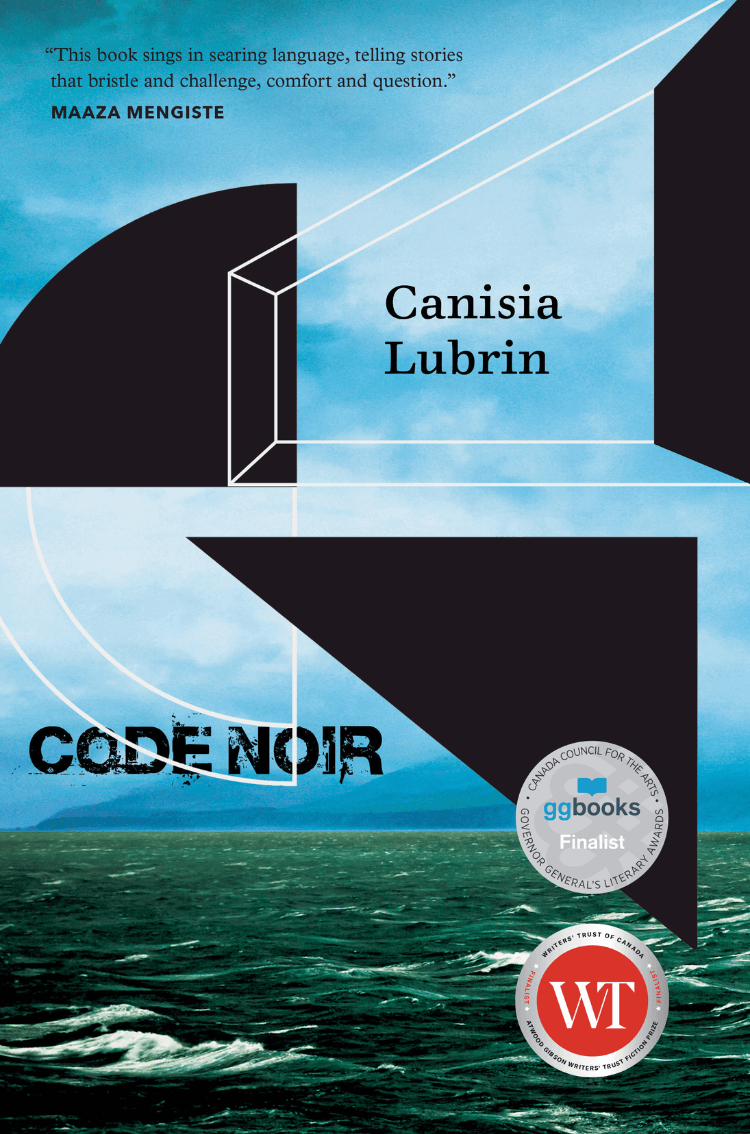
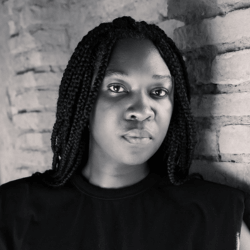
Code Noir
Canisia Lubrin, Alfred A. Knopf Canada / Penguin Random House Canada
Groundbreaking, dazzling debut fiction from one of Canada's most exciting and admired writers.
Canisia Lubrin's debut fiction is that rare work of art—a brilliant, startlingly original book that combines immense literary and political force. Its structure is deceptively simple: it departs from the infamous real-life “Code Noir,” a set of historical decrees originally passed in 1685 by King Louis XIV of France defining the conditions of slavery in the French colonial empire. The original Code had fifty-nine articles; Code Noir has fifty-nine linked fictions—vivid, unforgettable, multi-layered fragments filled with globe-wise characters who desire to live beyond the ruins of the past. Ranging in style from contemporary realism to dystopia, from futuristic fantasy to historical fiction, this inventive, shape-shifting braid of stories exists far beyond the enclosures of official decrees. This is a timely, daring, virtuosic book by a young literary star. The stories are accompanied by black-and-white drawings—one at the start of each fiction—by acclaimed visual artist Torkwase Dyson.
Canisia Lubrin’s books include Voodoo Hypothesis and The Dyzgraphxst. Lubrin’s work has been recognized with the Griffin Poetry Prize, OCM Bocas Prize for Caribbean Literature, the OCM Bocas Prize for Poetry, the Derek Walcott Prize, the Writer’s Trust of Canada Rising Stars prize, and others. Also a finalist for the Trillium Award for Poetry and Governor General's Literary Award, Lubrin has held fellowships at the Banff Centre, Civitella Ranieri in Italy, Simon Fraser University, Literature Colloquium Berlin, Queen’s University, and Victoria College at University of Toronto. She studied at York University and the University of Guelph, where she now coordinates the Creative Writing MFA in the School of English & Theatre Studies. In 2021, Lubrin received a Windham-Campbell prize for poetry, and the Globe & Mail named her Poet of the Year. Code Noir: Metamorphoses is her debut fiction, and includes stories listed for the Journey Prize (2019, 2020), Toronto Book Award (2018) and the Shirley Jackson Award (2021). Born in St. Lucia, Lubrin now lives in Whitby, Ontario, and is poetry editor at McClelland & Stewart.
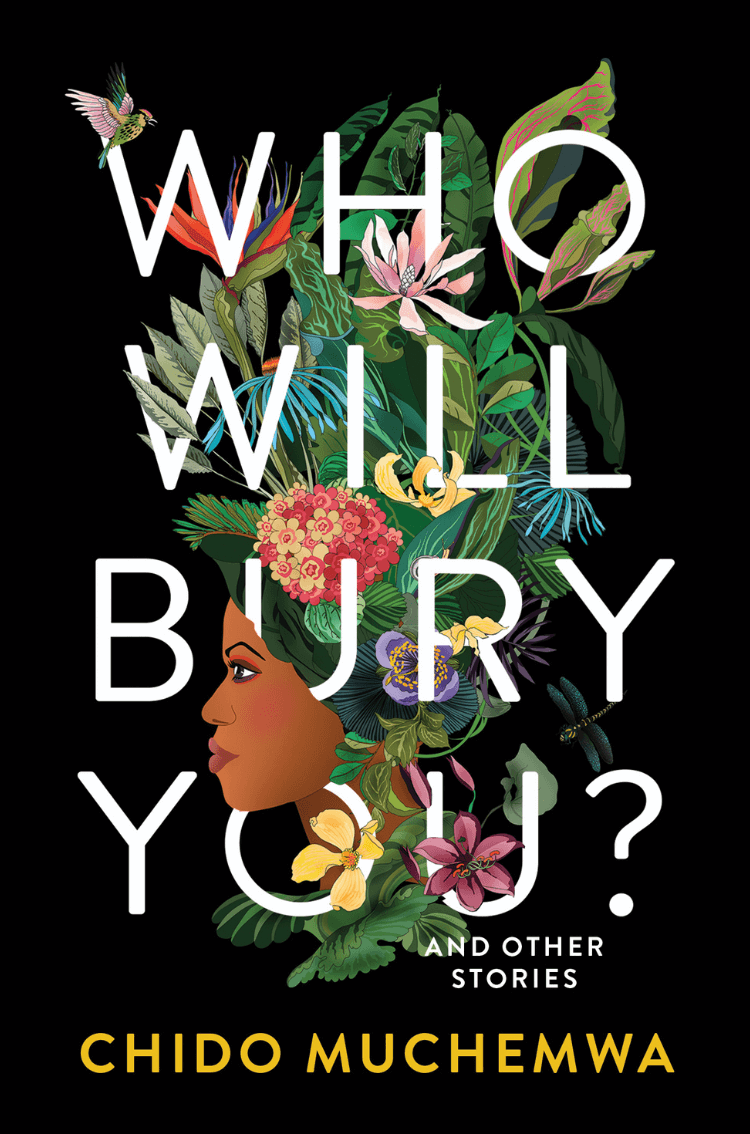
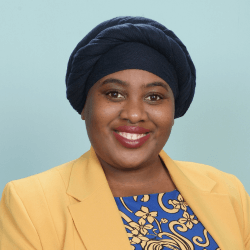
Who Will Bury You? And Other Stories
Chido Muchemwa, Astoria / House of Anansi Press
Intimate stories about Zimbabweans in moments of transition that force them to decide who they really are and choose the people they call their own.
Set in Toronto and Zimbabwe, the twelve elegant stories in Who Will Bury You? touch on themes of loss, identity, and inequality as they follow the lives of Zimbabweans who often feel like they are on the outside looking in. A mother and daughter navigate new relationship dynamics when the daughter comes out as a lesbian. Two sisters wonder what will hold them together after their grandmother’s death. A daughter tries to tell her father she loves him as she prepares to leave home for the first time. A journalist takes her grieving mother on a trip to report on girls who are allegedly being abducted by mermaids. A girl born to be the river god’s wife becomes a hero when chaos breaks out in the mighty Zambezi. A group of mothers discover just how far they are willing to go to protect their children during wartime.
Ephemeral yet beautifully satisfying, the stories in Chido Muchemwa's debut collection ask what makes people leave home, what makes them come back, and what keeps them there.
Born in Zimbabwe, Chido Muchemwa is a Toronto-based writer and academic. Her short stories have previously appeared in Augur, Baltimore Review, Catapult, FIYAH, Lolwe, and Prism International among many. She is a 2022 Miles Morland Scholar, and has an MFA in Creative Writing from the University of Wyoming.
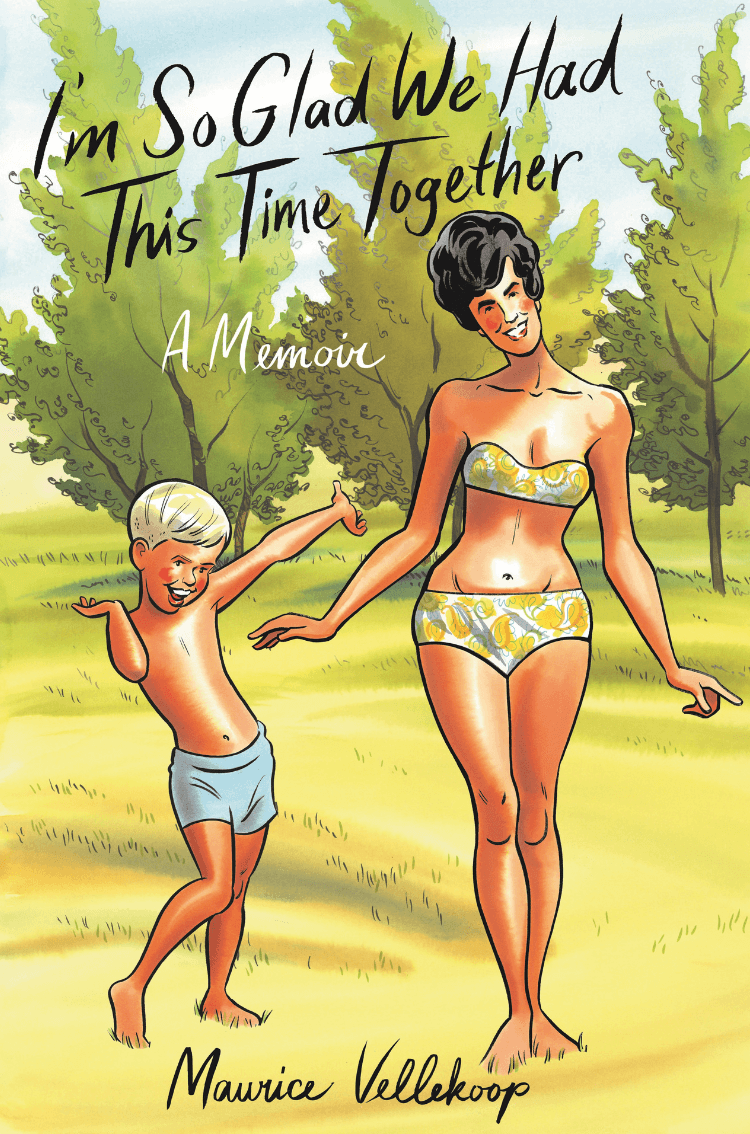

I'm So Glad We Had This Time Together
Maurice Vellekoop, Random House Canada / Penguin Random House Canada
“An utter treat among graphic novels. This beautiful, honest coming-of-age tale is a standout in its quality.... One of the best books so far this year.” —Toronto Star
For fans of Fun Home by Alison Bechdel, I’m So Glad We Had This Time Together is an epic graphic memoir about a queer illustrator surviving his intensely Christian childhood in 1970s Toronto.
Meet little Maurice Vellekoop, the youngest of four children raised by Dutch immigrants in the 1970s in a blue-collar suburb of Toronto. Despite their working-class milieu, the Vellekoops are devoted to art, music, and film, and they instill a deep reverence for the arts in young Maurice—except for literature. He’d much rather watch Cher and Carol Burnett on TV than read a book. He also loves playing with his girlfriends’ Barbie dolls and helping his Mum in her hair salon, which she runs out of the basement of their house. In short, he is really, really gay. Which is a huge problem, because the family is part of the Christian Reformed Church, a strict Calvinist sect. They go to church twice on Sunday, and they send their kids to a private Christian school, catechism classes, and the Calvinist Cadet Corps. Needless to say, the church is intolerant of homosexuality. Though she loves her son deeply, Maurice’s mother, Ann, cannot accept him, setting the course for a long estrangement.
Vellekoop struggles through all of this until he graduates from high school and is accepted into the Ontario College of Art in the early 1980s. Here he finds a welcoming community of bohemians, including a brilliant, flamboyantly gay professor who encourages him to come out. But just as he’s dipping his toes into the waters of gay sex and love, a series of romantic disasters, followed by a violent attack, sets him back severely. And then the shadow of the AIDS era descends. Maurice reacts by retreating to the safety of childhood obsessions, and seeks to satisfy his emotional needs with film- and theatre-going, music, boozy self-medication, and prolific art-making. When these tactics inevitably fail, Vellekoop at last embarks on a journey towards his heart’s true desire. In psychotherapy, the spiderweb of family, faith, guilt, sexuality, mental health, the intergenerational fallout of World War II, King Ludwig II of Bavaria, French Formula Hairspray, and much more at last begins to untangle. But it’s going to be a long, messy, and occasionally hilarious process.
I’m So Glad We Had This Time Together is an enthralling portrait of what it means to be true to yourself, to learn to forgive, and to be an artist.
Maurice Vellekoop was born in 1964 in a suburb of Toronto. A prolific artist and illustrator, he has worked non-stop for the last three decades. In addition to publications, his corporate clients include Swissair, Abercrombie & Fitch, Air Canada, Smart Car, and LVMH. He lives on Toronto Island with his partner Gordon Bowness.
French-language Finalists for the Trillium Book Award for Children’s Literature
Honouring excellence in French-language children's literature by Ontario authors
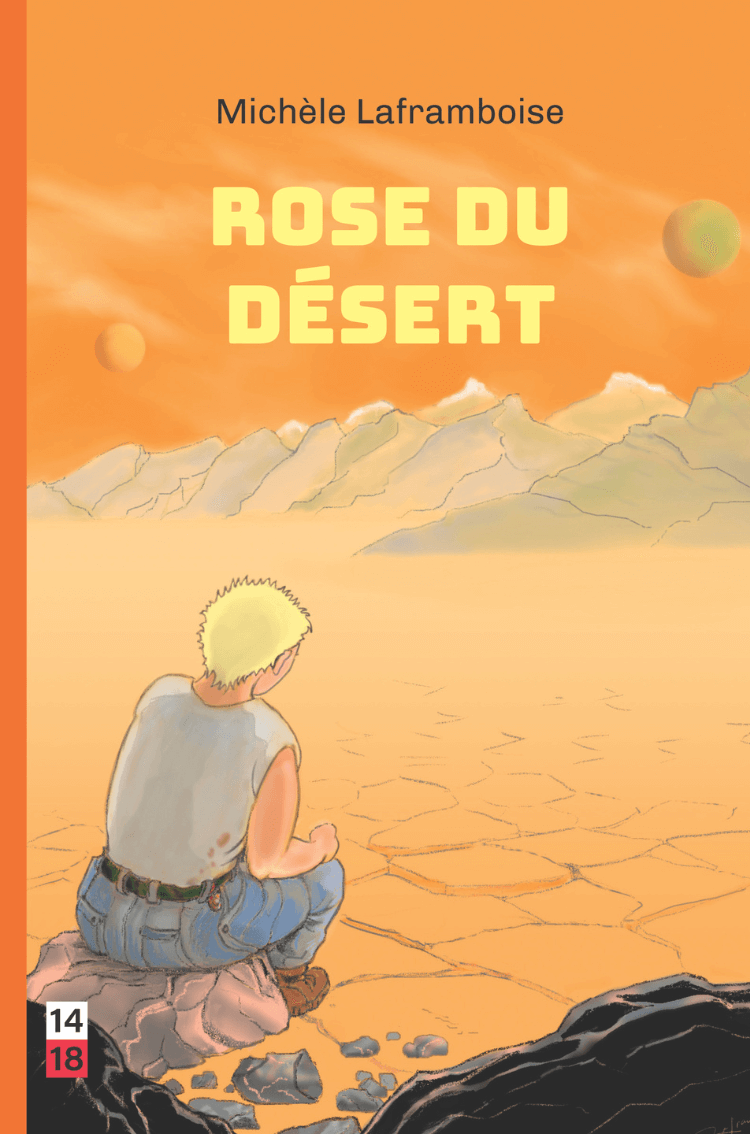
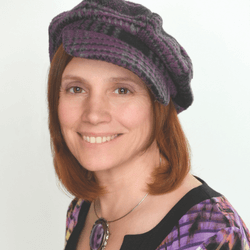
Rose du désert
Michèle Laframboise, Éditions David
In the hostile world of Sérail, families struggle to survive behind the Curtain that protects them from deadly drops in pressure.
Young Rose hates everything and everyone: Alouette the perfect, Paruline the flirt, William the fluffy, the dry river, chores and her own “fickle brain” that flits from one idea to the next… and struggles with math! Convinced that the Curtain made of whatchamacallit will fail, Rose closes herself off so completely that even Paruline, who tries to get closer to her, cannot reach her.
Meanwhile, incidents are occurring and the drought is worsening. Rose will have to move past her shortcomings and reach out to others to find solutions.
Rose du désert is a science fiction novel based on the universe and certain key characters from Secret de Paloma (2021).
Michèle Laframboise lives in Mississauga, in Southern Ontario, where she divides her time between drawing, writing and her family. With a background in science, she has established herself as a science fiction writer, crafting captivating stories set in mysterious worlds with her pen and brush. To date, she has published around 20 novels and comic books, as well as numerous short stories, which have earned her several distinctions and literary prizes, including the 2023 Trillium Book Award for Children’s Literature for Le secret de Paloma.
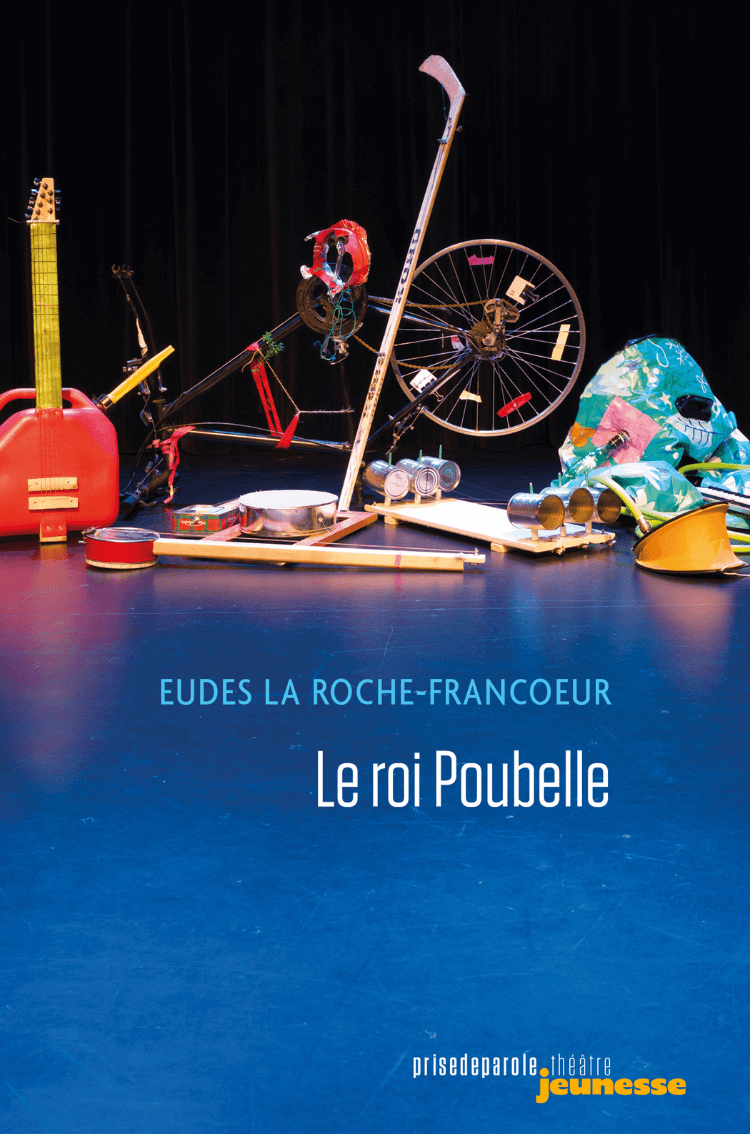

Le roi Poubelle
Eudes La Roche-Francoeur, Prise de parole
Élise, a documentary filmmaker, is shipwrecked in the middle of the North Pacific on a strange island made entirely of trash. The sole survivor, she searches for help and comes across Roi Poubelle, the trash king, who is the island’s only inhabitant and self-proclaimed sovereign.
Unaccustomed to human contact, he initially sees Élise as just another piece of trash to be transformed like the rest. After a difficult first encounter, they discover shared passions and slowly develop a fondness for each other.
But Élise cannot stay. She dreams of returning to the world she came from, a world that Roi Poubelle despises because it throws into the sea so many things that are precious to him.
Originally from the city of Québec, Eudes La Roche-Francoeur is a musical and youth theatre craftsman working throughout French-speaking Canada. Drawing on his experience working with and for young people, his theatre is imbued with compassion and unbridled imagination. Le roi Poubelle is his first published play.
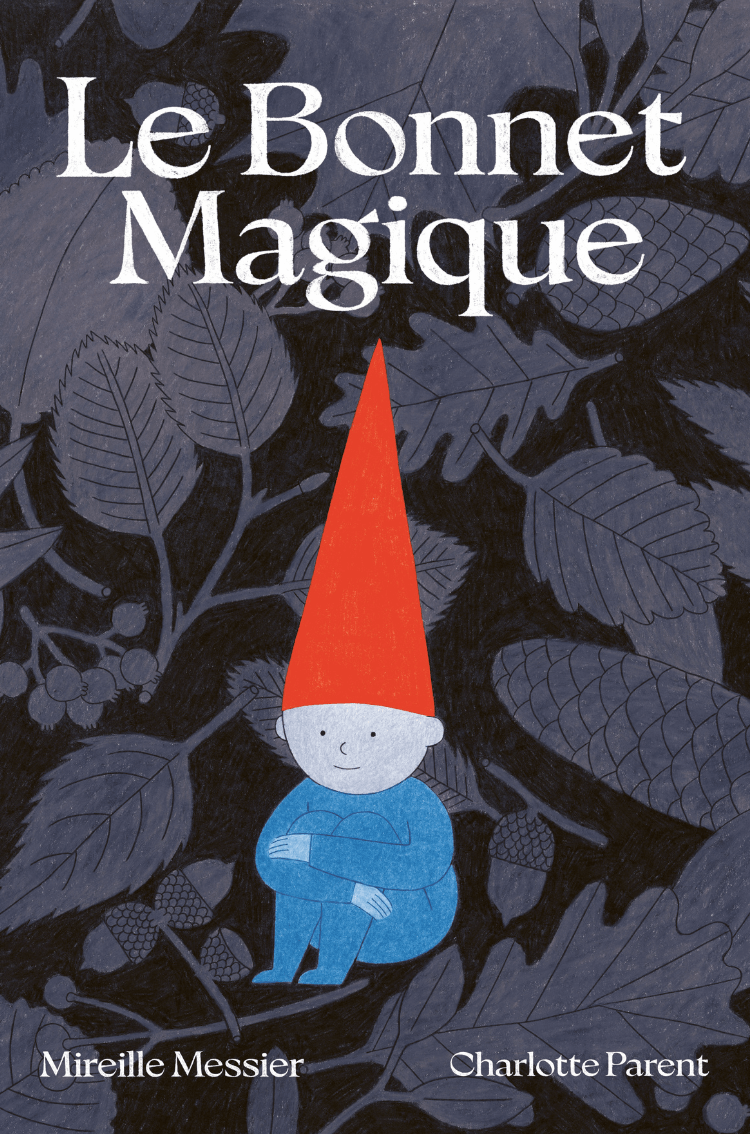
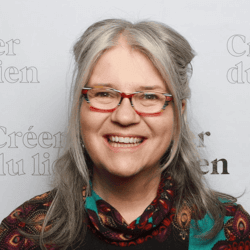
Le bonnet magique
Mireille Messier, Comme des géants
Many moons ago, Isaura, Arlo and their hedgehog Capucin lived in a tiny cottage. When their beloved pet falls ill, Isaura suggests going in search of gnomes with magical healing powers. Convinced that they will be able to help Capucin, the children venture into the forest with a few offerings, hoping to attract the little creatures with red hats.
Originally from Ottawa, Mireille Messier studied theatre and radio broadcasting. Through her work as a television screenwriter, Mireille Messier made her first foray into children’s literature in 1999. Since then, she has published around 30 novels, picture books and nonfiction books for young readers. Mireille Messier gives around 100 presentations a year in French-language and immersion schools across Canada. In addition to being an author, Mireille Messier is also a voice-over artist, screenwriter, director, translator and proud mother. Mireille divides her time between the big city of Toronto, Ontario, and the tiny village of Paradise, Nova Scotia.
Finalists for the Trillium Book Award for Poetry in English
Honouring excellence in English-language poetry by Ontario authors
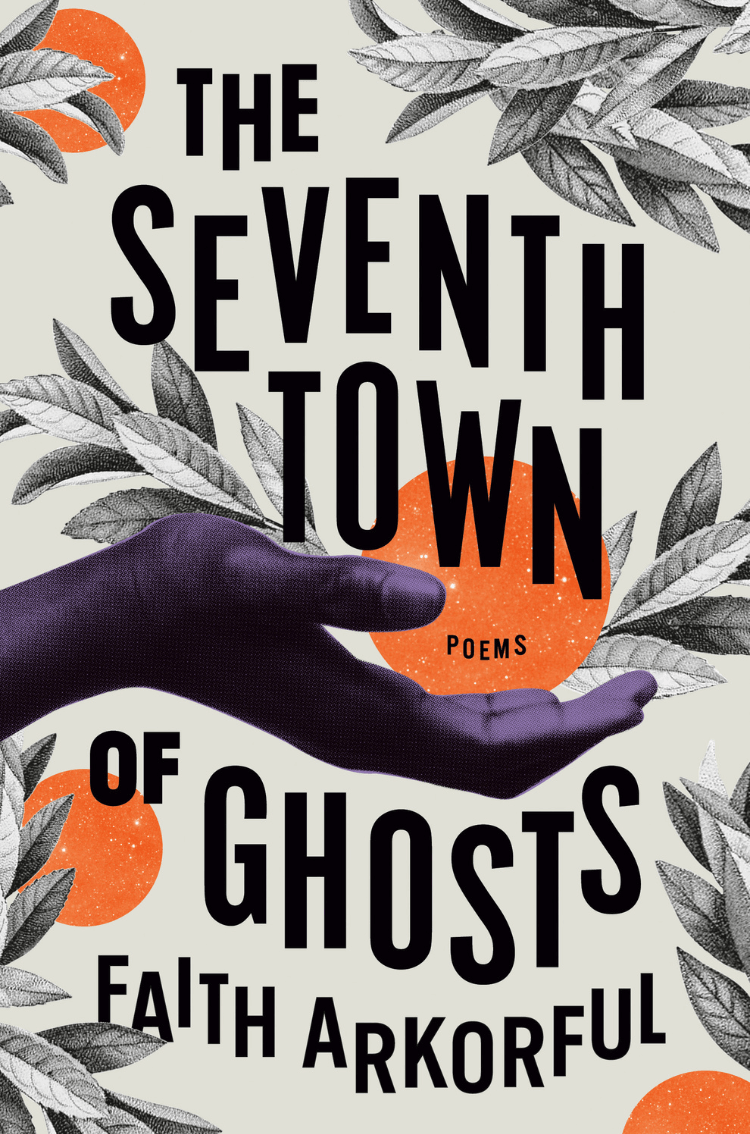
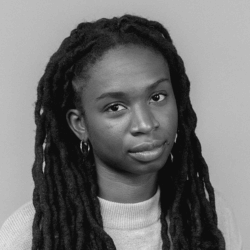
The Seventh Town of Ghosts
Faith Arkorful, McClelland & Stewart / Penguin Random House Canada
CBC Poetry Prize finalist and National Magazine Award honoree Faith Arkorful’s breathtaking, surpassingly thoughtful debut collection of poems.
Hauntings form the canopy of The Seventh Town of Ghosts. These titular towns, centred in yesterdays, tomorrows, and the ongoing, lead to a special kind of singing: songs to the reader who wrestles with existence, the unsure peace within family, and the often-tense interdependence of life.
Here, discernment is ever-present, guided by Faith Arkorful’s insights on not only the ravages of the state and the police upon the Black family and life at large, but also on a kaleidoscope of connections—sisterhood, daughterhood, kinship, solitude, death, romance—and how tenderness, chosen and repeated, can shield against life’s blows.
These towns also enchant, shape-lifting through humour, irony, and the small refractions of language where Arkorful guides us through the fault lines and the undertow, in the form of fruit, island volcanoes, Formula 1, and the expansive hum of life.
This poet-as-sojourner bears careful, caring witness, her attention reserved not only for her living and her dead but hyphenated two-fold by the fragile things and the lasting things. These poems remind us of what contours our mysterious and fleeting presence on Earth.
Faith Arkorful’s work has appeared in GUTS Magazine, Peach Magazine, PRISM International, Hobart Pulp, and Canthius Magazine, among other places. In 2022 she was a semi-finalist in the 92NY’s Discovery Poetry Contest. She received an honourable mention at the 2020 National Magazine Awards and in 2019 was shortlisted for the CBC Poetry Prize. Faith was born in Toronto, where she still resides.
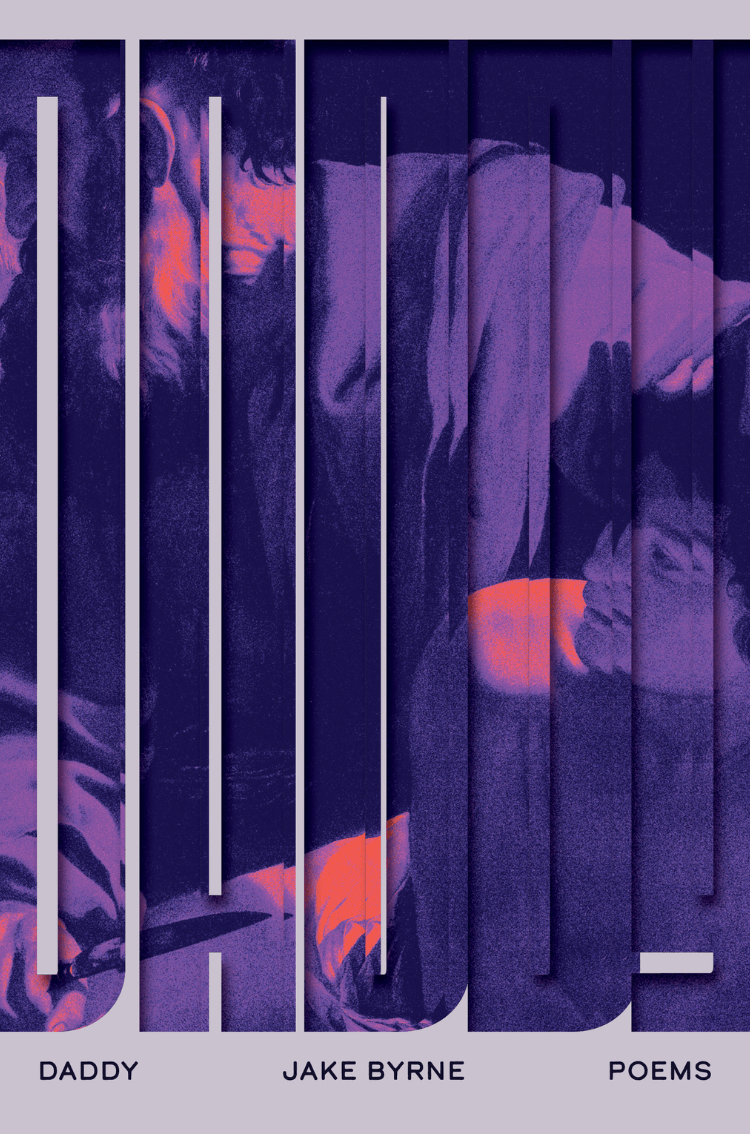
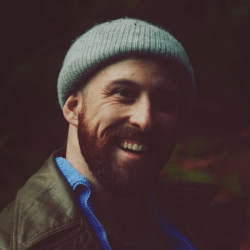
DADDY
Jake Byrne, Brick Books
If you reloop trauma enough, does it make a danceable rhythm? If you get lost in physical sensation enough, does that make you free?
DADDY is a powerful look at patriarchy, intergenerational trauma, and queer desire that seeks an unravelling of systems of control to reclaim vulnerability. At once confessional, playful, and sonically meticulous, Byrne's poems seek conversation with a voice in the mind that won't quiet. Cruel father figures dissolve into leather-clad muscle daddies on popper-scented dancefloors; the pain of the past sows the seeds of a joyful exploration of queer desire.
Jake Byrne is the author of Celebrate Pride with Lockheed Martin (Wolsak & Wynn, 2023) and DADDY (Brick Books, 2024). In 2019, they won CV2‘s Foster Prize for poetry. They live in Toronto/tka:ronto.
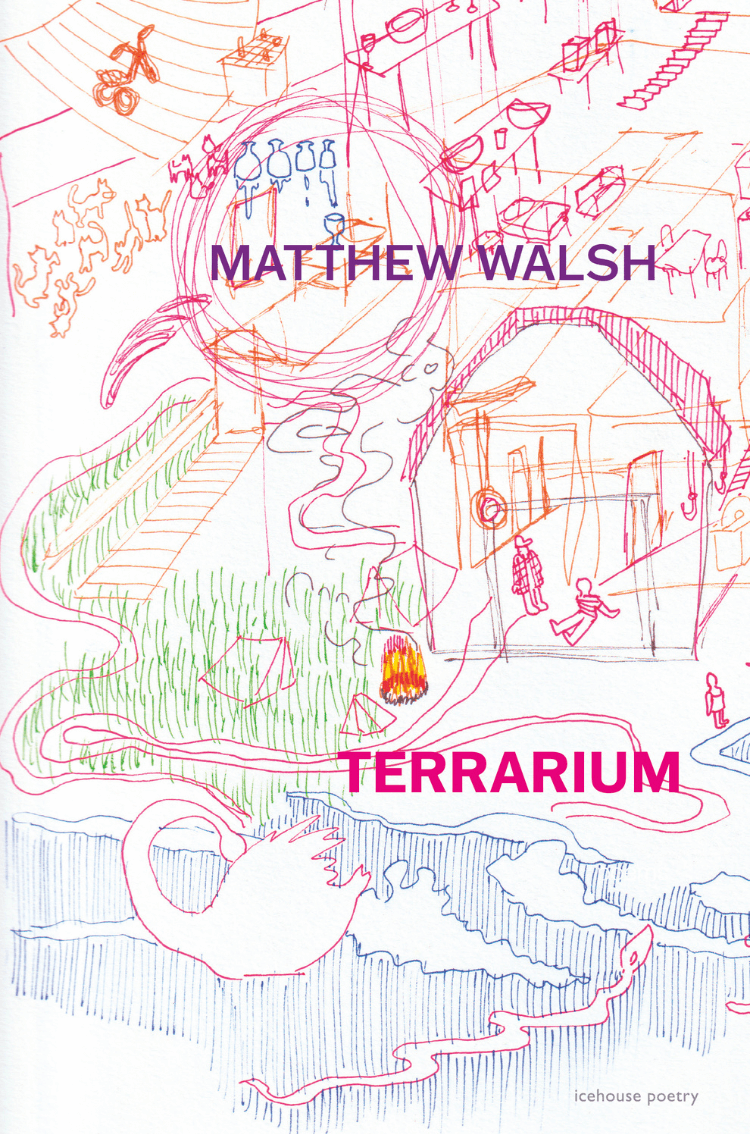
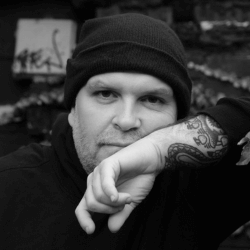
Terrarium
Matthew Walsh, icehouse poetry / Goose Lane Editions
Raw, confessional, and often messy, Terrarium continues Matthew Walsh’s exploration of Queer identity and desire against the lonely highs and lows of depression and addiction.
In this new collection, Walsh begins where their debut collection, These are not the potatoes of my youth, left off. Writing in their trademark conversational style, Walsh wanders from Toronto parkettes “with remnants of magnolia leaves” to California, “a long/black cocktail dress the night lights/amethyst and citrine against the arm/muscle of the sea,” their voice intimate and exposed, a whisper between friends or lovers.
And then, when they ruminate on influences and themes as diverse as the poetry of Frank O’Hara and Gwendolyn MacEwen, the vagaries of Instagram, and the reimagination of Miss Havisham in a Toronto bathhouse, they offer readers the opportunity to think deeply or laugh loudly, reaching out to close the gap between us.
Matthew Walsh grew up in Nova Scotia and now lives in Toronto. Their poems have appeared in Joyland, the Capra Review, the Antigonish Review, the Malahat Review, and Geist; in a chapbook entitled ICQ; and in their celebrated book-length collection These are not the potatoes of my youth, a finalist for the Trillium and Gerald Lampert Awards.
